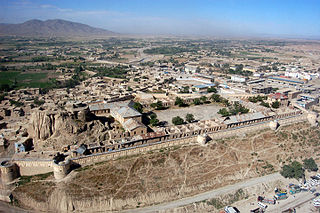Related Research Articles

Gardez is the capital of the Paktia Province of Afghanistan. The population of the city was estimated to be ca. 10,000 in the 1979 census and was estimated to be 70,000 in 2008. The majority of the city's native population is Pashtun. The city of Gardez is located at the junction between two important roads that cut, through a huge alpine valley. Surrounded by the mountains and deserts of the Hindu Kush, which boil up from the valley floor to the north, east and west, it is the axis of commerce for a huge area of eastern Afghanistan and has been a strategic location for armies throughout the country's long history of conflict. Observation posts built by Alexander the Great are still crumbling on the hilltops just outside the city limits. The city of Gardez has a population of 70,641. It has 13 districts and a total land area of 6,174 hectares (23.84 sq mi). The total number of dwellings in this city is 7,849.
The surname Al-Zaidi (Az-Zaidi) can denote one or both of the following:

Paktia is one of the 34 provinces of Afghanistan, located in the east of the country. Forming part of the larger Loya Paktia region, Paktia Province is divided into 15 districts and has a population of roughly 623,000, which is mostly a tribal society living in rural areas. Pashtuns make up the majority of the population and a small percentage include Tajiks. Gardez is the provincial capital. The traditional food in Paktia is known as (dandakai) which is made from rice and mung bean or green gram.
Gul is a common name in Persian, Pashto and Turkish languages, meaning rose. Gul is used as a family name in Europe, Central and South Asia.
Pacha Khan Zadran is a militia leader and a politician in the southeast of Afghanistan. He was a former anti-Soviet fighter and militia leader who played a role in driving the Taliban from Paktia Province in the 2001 invasion, with American backing. He subsequently assumed the governorship of the province. In 2002, he engaged in a violent conflict with rival tribal leaders in the province over the governorship of the province, shelling Gardez City and obstructing two separate appointed governors sent by Hamid Karzai.
Rahmatullah is a male or female Muslim name and, in modern usage, surname, meaning mercy of God. It may refer to:
Husseini is an Arabic surname.
Gilani, Gillani or Geelani is a toponymic surname (nisba) linked to the Gilan Province in Iran. It is also used by people indicating association with the founder of the Qadiriyya Sufi order Abdul Qadir Gilani. Some members refer to themselves as Kilani, however they maintain the same lineage. The Zoubi's also share the same lineage as the Gilani and the Kilani, owing to their ancestor Ahmad Ali Al Gilani who was later titled Al-Zoubi. Notable people with the surname include:
Asghar is a Persian name and may refer to:
Aftab is a surname and a masculine given name.
Mousavi is a surname. It is also spelled Moosavi, Moussaoui, Moussavi and Moussawi. The word is an adjective in Arabic which means descendants of Musa. Notable people with the name include:
Kazemi, Kazimi, Kazmi, or al-Kadhimi is a surname found most commonly in Iran, Syria, Iraq, Afghanistan, Pakistan and India. The surname is conventionally used by people who trace their patrilineal descent from Imam Musa al-Kazim, a Sayyid. Kazmi people are said to descend from Muhammad through his daughter Fatima. Musa al-Kadhim is revered as the seventh successor of Muhammad in Shia Islam i.e., he is the seventh Imam in the Hadith of the twelve successors.

Dand Aw Patan District is located in the northeastern section of Paktia Province in Afghanistan. It has a population of around 30,551 local residents. The district is within the heartland of the Zazi tribe of Pashtuns.
Ja'fari is a surname commonly associated with descendants of Ja'far al-Sadiq, an important Muslim scholar and the 6th Shia Imam. In South Asia, Persia and the Levant, those of this genealogy, also often take the honorific title of Sayyid. Descendants of Ja'far al-Sadiq can most commonly be found amongst the Shi'i of Iraq, Iran and the Indian subcontinent. Some Sunni Muslims also associate with the surname Ja’fari.

Gardez is a district in Paktia Province, Afghanistan. The center of the district which is also the capital of Paktia Province is Gardez.
Abdul Hai is a Muslim male given name, and in modern usage, surname. It is built from the Arabic words Abd, al- and Hayy. The name means "servant of the Living God", Al-Hayy being one of the names of God in the Qur'an, which give rise to the Muslim theophoric names.
Ataullah or the alternative Atallah is an Arabic given name meaning "gift of God", composed of Ata (gift) + Allah (God). It is also a surname to Middle Eastern Christians. The Iranian variant of the same name is Ataollah.
Baloch, Baluch or Baluchi is a surname. Notable persons with that name include:
Al-Hashimi, also transliterated Al-Hashemi, Hashemi, Hashimi, or Hashmi is an Arabic and Persian surname. The definite article Al- usually distinguishes the Arabic from the more numerous form.
Ansari or Al Ansari is a typically Muslim surname mainly found in the Middle East and South Asia. People with the surname Al-Ansari or Ansari are said to be the descendants of the Ansar tribesmen of Medina. Notable Ansaris include:
References
- ↑ Gardez, Afghanistan on GlobalSecurity.org website Retrieved 24 May 2022
- ↑ Maneesha Tikekar (2004). Gardezi. Bibliophile South Asia. ISBN 9788185002347 . Retrieved 24 May 2022– via Across the Wagah: An Indian's Sojourn in Pakistan (page 253) via Google Books.